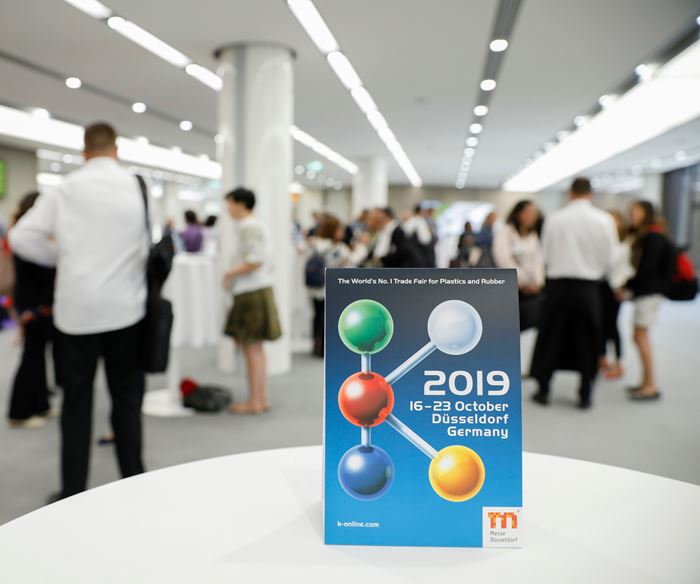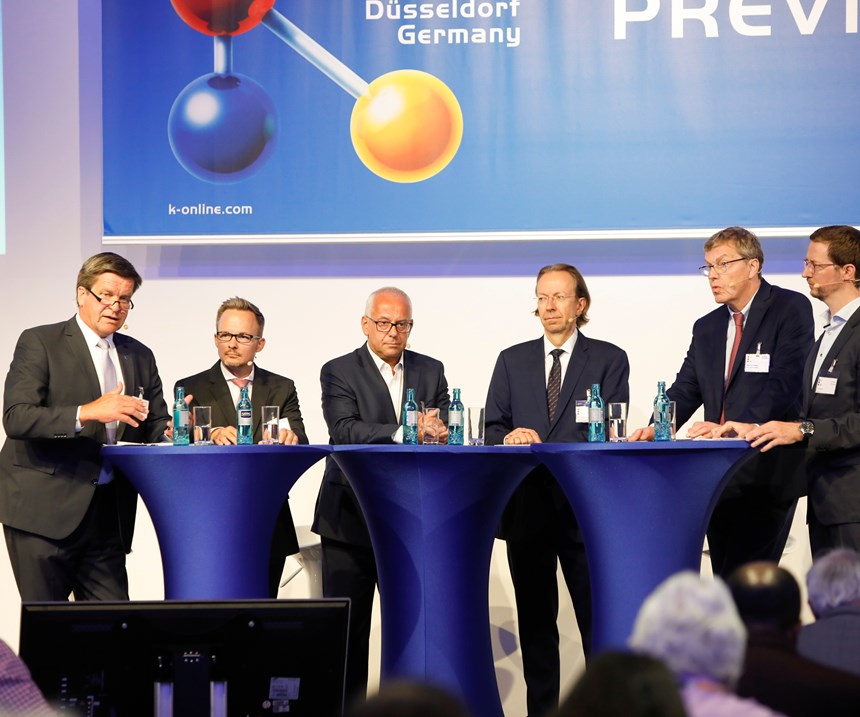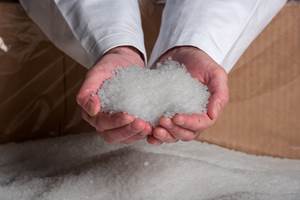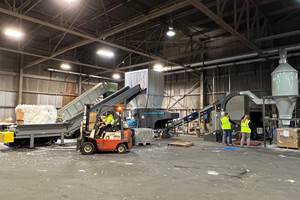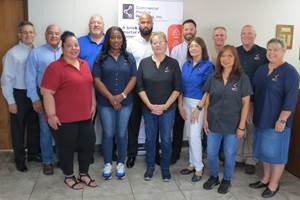Report from the K 2019 Preview: The Future of Plastics is Circular
During the K 2019 Preview in Düsseldorf, Germany, machinery and material suppliers discussed new initiatives and technologies dedicated toward incorporating sustainability into their offerings.
If anyone needs a reminder of how truly global the plastics industry is—K 2019 (October 16-23; Düsseldorf, Germany) will surely do so. The last K in 2016 recorded 3,293 exhibitors from 61 countries, attracted 232,053 trade visitors, including 71 percent from outside Germany.
As a tradition, Messe Düsseldorf invited around 80 journalists from 32 countries for the K 2019 Preview from July 1-3. During 12 press conferences held by K exhibitors over three days in Düsseldorf, there was plenty of product news.
Here at Plastics Technology magazine, we are currently putting together our K 2019 Preview Issue (if you have product news, send it our way!). But I want to first give you some highlights of major topics and themes discussed at the K 2019 Preview that will no doubt be a huge focus during the trade show. Spoiler alert: it’s all about sustainability.
A Good Time to Be in Recycling
K 2019 comes at a time where public perception of plastics is low. The preview event kicked off with a roundtable discussion that covered the current state of the industry.
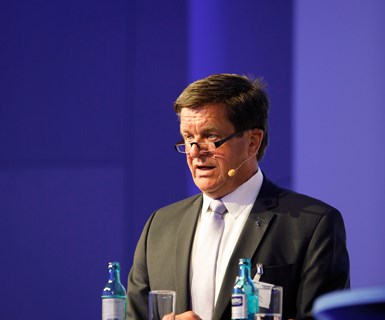
Ulrich Reifenhäuser, CEO of the Reifenhäuser Group
“We have a problem. Big problem. A serious problem. The big problem is the environment— if you see pictures of marine litter, it’s very bad for that environment so we have to solve it. With those pictures, plastics and packaging, has got a tremendously bad image and this puts pressure on us. 2019 is a different year than years before,” said Ulrich Reifenhäuser, CEO of the Reifenhäuser Group.
“There’s no part of daily life where plastics won’t play a role,” said Rüdiger Baunemann of PlasticsEurope. “We do see a small decline with some critical discussions surrounding world trade and the environment. We’ve always had a high reputation for the industry and the material—that has changed. The negative and emotional pictures of environment pollution will have an impact on the plastics industry. And the way the plastics industry should react—we see that as important part of the K Fair.”
“We owe this industry something. We need to join everyone else in the challenge to fix this issue.”
“You can imagine the recycling machinery are very lucky guys,” Reifenhäuser explained. “Recyclability nowadays is the most important subject for research and development. We have to convince the customer, the media and the public that everything is somehow concentrated on solutions in this field. Yes, the machines will be faster and the products thinner—that’s what we do—but overall it’s about recyclability and the circular economy. We have to take care of recyclability, and this cannot be done by the machinery builders alone—it has to be a big joint production.”
Also on the machinery side, KraussMaffei said that for more than three decades, the company has been involved with recycling in research and development—and this will be the strategic focus at this year's K trade fair. At the event, the company will launch Polymore, a new B2B online marketplace for the procurement and sale of compounds, masterbatches, recycled materials and post industrial materials in Europe.
Frank Stieler, CEO of KraussMaffei, said: “Why is a company like KraussMaffei moving into this? We believe the plastic sector has a challenge as an industry, and we believe by just building machines that’s not an excuse to argue that we don’t have a reason to help and to solve the challenges of the circular economy. We believe we benefit from this industry, it gives us our bread and butter, so we owe this industry something. We need to join everyone else in the challenge to fix this issue.”
Material Companies Embracing Recycling
With an overall shift in focus on recycling from the industry, it’s been notable that many material companies have thrown their hats into the recycling ring.
Michael Zobel, head of the high performance materials business unit for Lanxess, said the circular economy is a core topic for the company. The company is running a series of pilot projects to look at chemical recycling and other recycling options.
The long-term success is possible only if the entire value chain works together—it doesn’t make sense to move just one element of value chain to try something.
He also empathized how the entire industry must collaborate.
“The goal is to bring plastic back into new and quality applications,” he said. “The long-term success is possible only if the entire value chain works together—it doesn’t make sense to move just one element of value chain to try something. It starts at the beginning: raw material suppliers, machinery, brand owners, recyclers. Only by the entire supply chain working together will make the circular economy a success.”
Covestro will promote a “sustainable and digital world” through its showcase at the K. CEO Markus Steilemann named the development of a functioning circular economy and
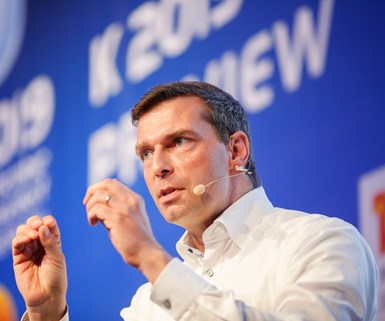
Covestro CEO Markus Steilemann
improved management of limited fossil resources, primarily crude oil, as central points for increased sustainability. “These are goals that will impact society as a whole and Covestro wants to contribute to this. Within our company, we want to establish material cycles along the entire value chain, from suppliers, to production and logistics, to the use of our products and their reuse,” Steilemann said.
When recycling used plastics, it will be important to be able to exhaust all technical possibilities. “The relatively new method of chemical recycling is also an option, which requires additional support,” he said.
A key aspect for developing a circular economy in the plastics and chemical industry is closing the carbon cycle with recycled resources, he added.
BASF showcased proof of concept for its ChemCycling (chemical recycling) project. Reps from Südpack, Storopack, Jaguar Land Rover and Schneider Electric all presented about work in this area.
- Jaguar Land Rover (JLR) developed a plastic front-end carrier prototype for its first electric SUV, the I-Pace, out of Ultramid B3WG6 Ccycled Black 00564.
- Storopack, a globally active supplier of protective packaging and technical molded parts, used Styropor P recycled to make insulation packaging for temperature sensitive pharmaceutical products as well as boxes for transporting fresh fish and protective packaging for electronic devices.
- Südpack, a producer of film packaging in Europe, produced a polyamide film and a polyethylene film that were processed into specially sealed packaging for mozzarella. Until now, multi-layer packaging has usually been considered to be only recyclable to a limited extent.
- Schneider Electric, a provider in the digital transformation of energy management and automation, manufactured a circuit breaker from chemically recycled Ultramid.
Johannes Remmele, managing partner of Südpack, said: “We’re under enormous pressure to justify what we do and produce, so we need new processes to recycle plastic better and more efficiently. The industry has to rise up to those challenges. We at Südpack didn’t hesitate to work with BASF on this great concept. ChemCycling will allow us to significantly recycle large quantities of plastic in the future and recover the raw material.”
Related Content
‘Monomaterial’ Trend in Packaging and Beyond Will Only Thrive
In terms of sustainability measures, monomaterial structures are already making good headway and will evolve even further.
Read MorePurpose-Built System Enhances Capacity and Flexibility for Recycler
A Boston recycler invested in a turnkey shredding, granulation and elutriation system to expand its plastics reclaim business.
Read MoreMultilayer Solutions to Challenges in Blow Molding with PCR
For extrusion blow molders, challenges of price and availability of postconsumer recycled resins can be addressed with a variety of multilayer technologies, which also offer solutions to issues with color, processability, mechanical properties and chemical migration in PCR materials.
Read MoreInside the Florida Recycler Taking on NPE’s 100% Scrap Reuse Goal
Hundreds of tons of demonstration products will be created this week. Commercial Plastics Recycling is striving to recycle ALL of it.
Read MoreRead Next
People 4.0 – How to Get Buy-In from Your Staff for Industry 4.0 Systems
Implementing a production monitoring system as the foundation of a ‘smart factory’ is about integrating people with new technology as much as it is about integrating machines and computers. Here are tips from a company that has gone through the process.
Read MoreBeyond Prototypes: 8 Ways the Plastics Industry Is Using 3D Printing
Plastics processors are finding applications for 3D printing around the plant and across the supply chain. Here are 8 examples to look for at NPE2024.
Read More

